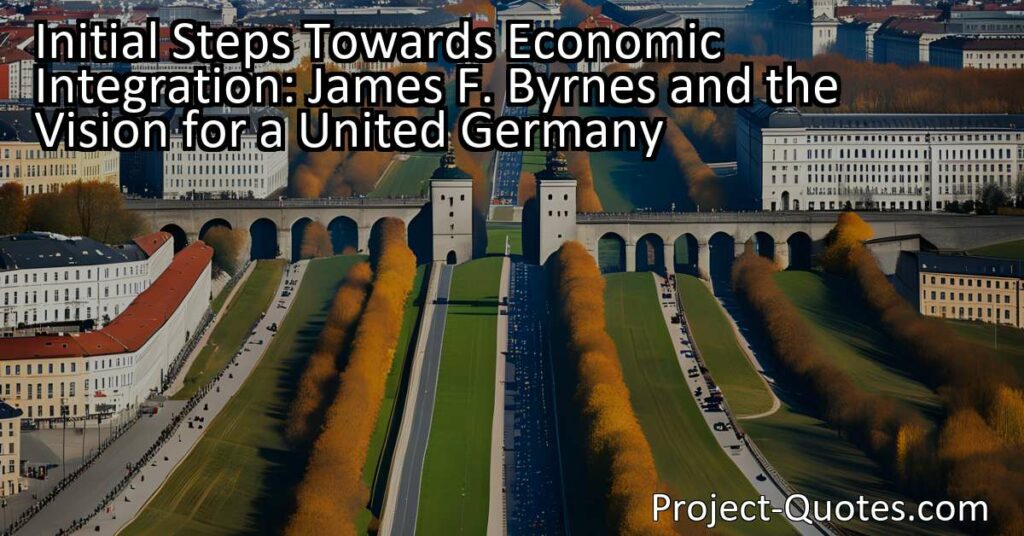We favor the economic unification of Germany. If complete unification cannot be secured, we shall do everything in our power to secure the maximum possible unification.
James F. Byrnes
Initial Steps Towards Economic Integration: James F. Byrnes and the Vision for a United Germany James F. Byrnes’s support for the economic unification of Germany was a crucial step towards stability and prosperity in post-World War II Europe. His determination to achieve the maximum possible unification paved the way for future success and set an example for other regions seeking economic integration. The economic unification of Germany has proven to be a success story, showcasing the power of unity and collaboration in overcoming divisions and working towards a common goal.
Table of Contents
- 1 We favor the economic unification of Germany. If complete unification cannot be secured, we shall do everything in our power to secure the maximum possible unification.
- 2 James F. Byrnes
- 3 Meaning of Quote – We favor the economic unification of Germany. If complete unification cannot be secured, we shall do everything in our power to secure the maximum possible unification.
- 4 Freely Shareable Quote Image
- 5 Related
Meaning of Quote – We favor the economic unification of Germany. If complete unification cannot be secured, we shall do everything in our power to secure the maximum possible unification.
In a speech delivered by James F. Byrnes, the idea of economic unification of Germany resonates strongly. Byrnes was an influential figure in American history, serving as the United States Secretary of State during the critical post-World War II era. His words reflect a significant shift in global politics and the determination to rebuild and unite a war-torn Germany.
“We favor the economic unification of Germany.” These words are unambiguous in their support for an important endeavor that would not only benefit Germany but also have far-reaching implications for Europe. Byrnes understood the potential power of a united Germany, one that could serve as an economic powerhouse and contribute to stability in the region. He recognized that the mere political unification of Germany would not suffice; economic integration was necessary for long-term success.
The economic unification of Germany was a complex task that required addressing numerous challenges. In the aftermath of World War II, Germany was in ruins, both physically and economically. The country was divided into four occupation zones controlled by the Soviet Union, the United States, Great Britain, and France. These divisions brought about different political ideologies and approaches to reconstruction, making the idea of unification seem daunting.
However, Byrnes’s unwavering commitment is evident when he states, “If complete unification cannot be secured, we shall do everything in our power to secure the maximum possible unification.” This sentiment recognizes the potential roadblocks that might hinder complete unification but underscores the determination to achieve the highest level of unity attainable.
Byrnes understood that a united Germany held the key to a stable Europe. He recognized the importance of a strong German economy and its potential to promote peace and prosperity throughout the continent. A unified Germany could bolster European economies, foster trade relations, and bring about increased cooperation among nations.
Economic unification would not only uplift Germany but also provide opportunities for the neighboring countries. It would facilitate the movement of goods, services, and labor across borders, creating an integrated economic market within Europe. This would boost trade, increase investment opportunities, and generate economic growth for all participating nations.
One of the primary concerns that necessitated economic unification was the threat of another devastating war. Byrnes, a witness to the horrors of World War II, was acutely aware of the destructive power of conflicts. The economic integration of Germany was viewed as a means to prevent future hostilities by fostering interdependence and promoting collaboration among nations.
Byrnes recognized that fostering economic integration was a delicate balancing act. It required striking a chord between promoting German sovereignty and ensuring the equitable distribution of resources and power among European nations. The goal was to avoid any country dominating others economically, maintaining an environment of mutual cooperation and trust.
The economic unification of Germany went hand in hand with the formation of supranational institutions such as the European Coal and Steel Community (ECSC) in 1951. The ECSC aimed to pool the coal and steel resources of its member countries, including Germany, France, Italy, Belgium, Luxembourg, and the Netherlands. This marked the beginning of a larger integration process that later led to the establishment of the European Union.
The efforts to secure economic unification faced numerous challenges, including differing political interests, nationalistic sentiments, and logistical obstacles. However, Byrnes’s determination to achieve the maximum possible unification helped pave the way for success. His words were not empty promises but a reflection of the commitment exhibited by many individuals and nations involved in the rebuilding of Europe.
Over time, economic unification has proven to be a crucial factor in Germany’s rise as an economic powerhouse. The nation’s commitment to rebuilding, technological advancements, and strategic investments have propelled its economy to the forefront, making Germany one of the leading economies in the world today.
Furthermore, the economic unification of Germany has had a profound impact on European stability. By fostering economic interdependence and cooperation, it has contributed to the creation of a peaceful and prosperous continent. The European Union, which evolved from the initial steps taken towards economic integration, stands as a testament to Byrnes’s vision and the collective resolve of many.
In conclusion, James F. Byrnes’s quote encapsulates the dedication and determination to achieve the economic unification of Germany. His words reflect not only a specific moment in history but also a broader understanding of the power of unity and collaboration. Byrnes recognized the potential of a united Germany to foster stability, promote economic growth, and prevent future conflicts. The economic unification of Germany has undoubtedly been a success story, setting an example for other regions seeking to overcome divisions and work towards a common goal.
I hope this quote inspired image brings you hope and peace. Share it with someone who needs it today!


